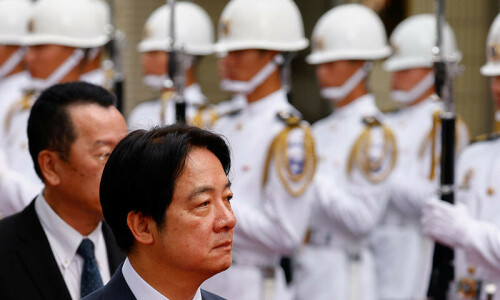BERLIN: German Chancellor Angela Merkel meets US President Barack Obama this week with shared fears over the mounting Ukraine crisis helping to mend ties ruptured by the NSA eavesdropping scandal.
As tensions between Russia and the West unseen since the Cold War threaten to boil over, officials and analysts said ahead of Merkel’s two-day visit starting Thursday that Ukraine had given Obama and the German leader common purpose after a difficult half year.
Possibilities for bringing pressure to bear on Russian President Vladimir Putin — including economic sanctions — and progress on agreeing a major transatlantic trade accord known as TTIP are just two of the main issues on the agenda, said a senior Merkel aide.
It is Merkel’s first trip to Washington since revelations by fugitive intelligence contractor Edward Snowden that her mobile phone was also targeted in sweeping overseas surveillance by the US National Security Agency.
After Obama extended the invitation to Merkel, she noted in January that it would take “more than one trip” to repair the damage done.
Her spokesman Steffen Seibert admitted on Friday that, although Berlin last year pressed for a mutual “no-spy” pact with Washington, “concrete results “were not expected during Merkel’s stay.
The United States is seen as unwilling to set a fresh international precedent by entering into such an agreement with Germany.
News weekly Der Spiegel said that the Ukraine crisis would allow the “pragmatic” Merkel to paper over that humiliating failure because a more pressing issue had taken centre stage.
“Thank Putin: due to the escalation in Ukraine, Merkel’s meeting with Obama can demonstrate transatlantic unity while in reality a deep rift remains,” it said.
The director of the transatlantic relations programme at the Atlantic Council in Washington, Frances Burwell, said the US administration would be foolish to think Merkel or the German public had forgotten the NSA issue.
“I would expect that while Ukraine has made clear the need for the US and Europe to work very closely together and overcome the differences that we see on the NSA, it is still necessary to address these issues and to work towards a resolution,” Burwell said.
A senior German official said that “of course the government is disappointed” by the failure to secure anti-espionage guarantees from Washington, while another said it would probably take “years” before such a pact could come about.
Merkel, the longest serving leader in the G8, is set to arrive in Washington on Thursday and meet Obama on Friday at the White House, where they will give a joint press conference before having lunch together.
She will also address the US Chamber of Commerce with a speech centred on TTIP, and meet International Monetary Fund chief Christine Lagarde and US senators.
A Merkel adviser said aid to debt-mired Ukraine to help it pay its massive outstanding gas bills from Russia and stabilise its economy would dominate the talks with Lagarde.
The director of the Berlin office of the German Marshall Fund of the United States, Heike MacKerron, said that Merkel saw TTIP, which both sides hope to conclude next year, as a crucial deal to cement ties in the long run.
“Merkel views TTIP as a big opportunity for German jobs, the German economy,” she told AFP.
“And I think Merkel is a chancellor who, despite the NSA, views transatlantic relations as key for Germany and so I think her hope is that something like TTIP will reaffirm the transatlantic relationship because frankly, I don’t think we have much else as a common project. “Obama in 2011 honoured Merkel with a White House state dinner, and she welcomed him to Berlin last year for a long-awaited visit with a rare invitation to speak at the Brandenburg Gate.
MacKerron said Merkel, who grew up in communist East Germany, and Obama were both analytical politicians who saw their personal ties as there to serve the Western alliance, particularly in trying times.
“I think crises like the one we have now in Ukraine make it obvious to many people including Merkel where our allies are. They are definitely more on the other side of the Atlantic than at the Urals,” she said.—AFP












































Dear visitor, the comments section is undergoing an overhaul and will return soon.